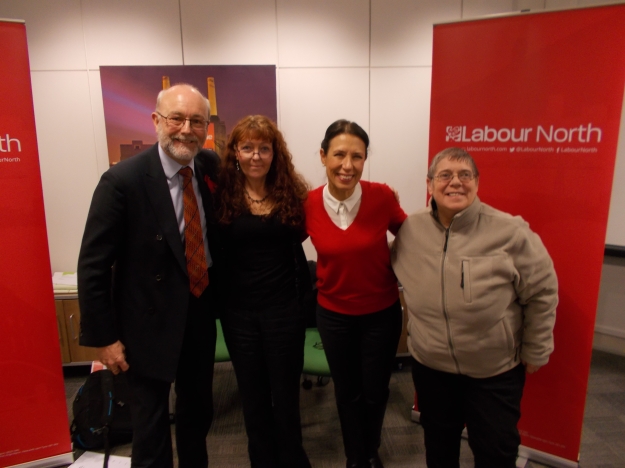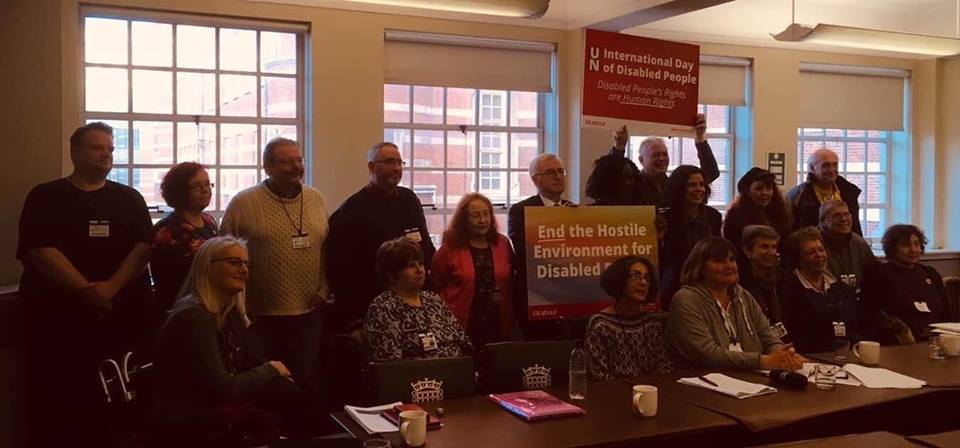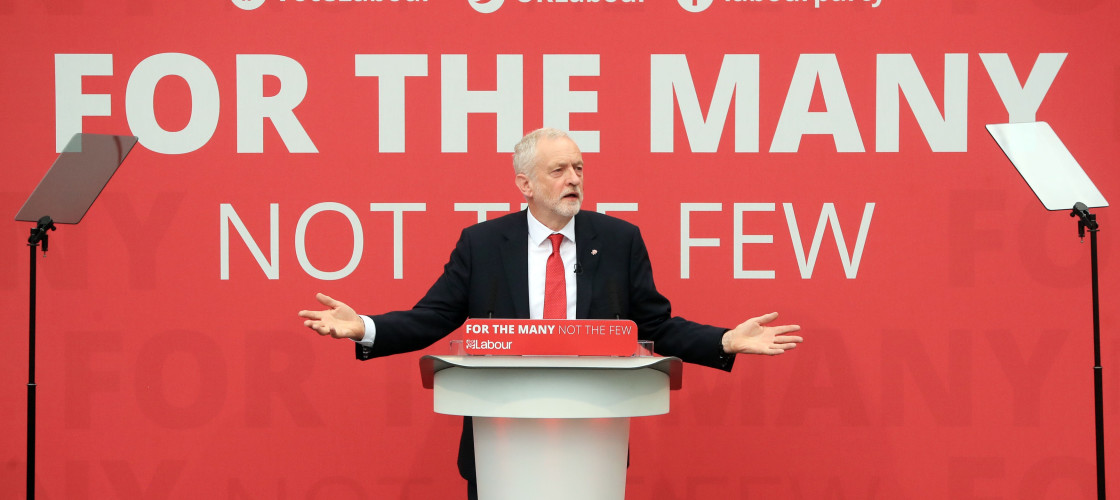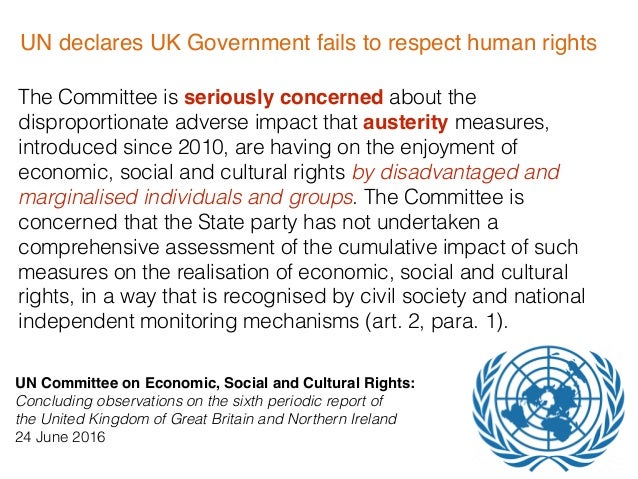
Disabled campaigners, researchers and organisations who have played a key role in exposing the discrimination and harm caused by the government’s social security reforms have been travelling to Westminster to attend round table discussions with five Labour shadow ministers. The meetings are chaired by Shadow Chancellor John McDonnell. I was invited to attend by John McDonnell’s office in September, because of my own ongoing campaign work.
The meetings are also the launch of a series of campaigning efforts and consultation between the Labour party, disabled activists, researchers and allied organisations. Labour MPs also hope to secure support from members of other political parties in the longer term.
We will be continuing to challenge the government’s persistent denial of a ‘causal link’ between their draconian social security policies and the distress, systematic human rights violations, serious harm and deaths of disabled people that have arisen in correlation with those policies.
Unless the government undertakes a cumulative impact assessment of the harm and injustices that have followed in the wake of their welfare reform acts, they cannot provide evidence to support their own claims and flat denials that their policies are causing hardship, harm and distress.
Public health experts from the Universities of Liverpool and Oxford have also produced a research report titled First, do no harm’: are disability assessments associated with adverse trends in mental health? A longitudinal ecological study. It highlights that the process of reassessing people on incapacity benefit for the new employment and support allowance (ESA) from 2010 to 2013 was “associated with” an extra 590 suicides, 279,000 additional cases of self-reported mental health problems, and the prescribing of a further 725,000 anti-depressants.
Speaking to the Huffington Post last year, the shadow chancellor said that he became furious during a Parliamentary debate when he demanded a comprehensive assessment of the cumulative impact of welfare reforms on disabled people and the government refused. He praised the website Calum’s List, which details the cases of at least 60 deaths linked to welfare cuts.
He added: “We said to the Government we know now from Calum’s List, listing people from reports in the press and elsewhere of people committing suicide as a result of Government cuts.
“We knew the Government were monitoring some coroners’ reports and we wanted them published, but [then DWP minister Esther] McVey wouldn’t and I got really angry.”
“Next week, what we are doing is getting a group of campaigning organisations and a group of experts together to talk about the way in which Work Capability Assessments are still having an impact, to try to get to the bottom in terms of mental health and suicide.”
McDonnell added that Labour’s first Queen’s Speech include legislation “making sure we have a welfare and benefit system that lifts people out of poverty”.
He said that his Hayes and Harlington constituency casework now operates an open-door system four days a week due to demand from people hit by government cuts.
He added: “Helen who runs my office said the casework now is on a scale and a depth of suffering that we’ve never seen before. And this in a constituency with the [Heathrow] airport, high levels of employment but wages not matching the housing costs and the pressure on people working all hours just to keep a roof over their heads.
“If anything goes wrong they fall out of the system. Last month we were dealing with two families living in cars. We also have the ‘beds in sheds’ phenomenon, families living in a shed or garage rented out to them, it’s staggering really.
“Before this last eight years, those sort of horrendous situations would be infrequent but you wouldn’t have someone so heavily sanctioned. The sanctions often impact on people with mental health conditions hardest.”
The Labour party’s track record of inclusion and democratic consultation with disabled citizens and their communities contrasts starkly with the Conservative’s exclusionary ‘we know better than you’ approach to disability policies. The government have imposed cuts on disabled people, acting upon them as if they are objects of policy rather than being citizens within a democracy.
Government policies are expressed political intentions regarding how our society is organised and governed. They have calculated social and economic aims and consequences. In democratic societies, citizens’ accounts of the impacts of policies ought to matter.
However, in the UK, the way that welfare policies are justified is being increasingly detached from their aims and consequences, partly because democratic processes and basic human rights are being disassembled or side-stepped, and partly because the government employs the widespread use of linguistic strategies and techniques of persuasion to intentionally divert us from their aims and the consequences of their ideologically (rather than rationally) driven policies. Furthermore, policies have more generally become increasingly detached from public interests and needs.
The Labour party listen to citizens’ accounts, and have always acknowledged our concerns. John McDonnell was involved in the setting up of Disabled People Against the Cuts (DPAC). After a nationwide round of consultations with disabled people about policies which enshrine the Equality and Human Rights acts, led by Debbie Abrahams, the Labour party wrote an additional manifesto, outlining policies for disabled people, called Nothing about you without you, which many of us have contributed to.

Alex Cunningham, me, Debbie Abrahams and Gail Ward after the Disability Equality Roadshow and consultation in December, 2016.
The First Do No Harm lobby on 13 February aims to expose the continued harm caused to disabled people by government social security reforms, and to seek safeguarding changes to the social security system. It follows many years of growing concerns about the controversial Work Capability Assessment (WCA) and the failure of Department for Work and Pensions (DWP) ministers to make the necessary changes to make the assessment process safe.
Disability rights campaigners and MPs will focus on the repeated failure of the DWP to ensure that the “further medical evidence” needed to demonstrate a disabled person’s eligibility for out-of-work disability benefits is always collected, particularly for claimants with mental health conditions.
The three key asks of the lobby are:
1. To incorporate the principle of “First Do No Harm” into the assessment process for disabled people in the welfare system.
2. To call for the publication of a cumulative impact assessment of social security changes to disabled people.
3. To implement an assessment framework that treats disabled people with dignity and respect.
The lobby has been facilitated by Labour’s Treasury and work and pensions teams, through shadow chancellor John McDonnell and shadow work and pensions secretary Margaret Greenwood. Both Labour MPs and activists hope that MPs from all parties will attend.
Shadow chancellor, John McDonnell has previously said that he believed the ongoing meetings with disability rights campaigners and allied organisations could herald the start of “a significant movement to expose the brutality of the system” and secure “permanent change”.
He told Disability News Service: “Disabled people have had enough of the continuing austerity, attacks and discrimination.
“The lobby will brief on the plight of disabled people and lobby for reform to protect against this harm.” The aim is to push for the principle of “First Do No Harm” to be included in the benefits assessment process, through a framework that “treats disabled people with dignity and respect”.
The lobby also aims to push the government to acknowledge years of raised concerns by our community to carry out a cumulative assessment of the impact of its social security cuts and reforms on disabled people.
Campaigners will also call for an end to the government’s punitive sanctions and conditionality regime.
The First Do No Harm lobby is the first organised action arising from the ongoing meetings between disabled activists and allies and Labour shadow ministers, including John McDonnell, Margaret Greenwood and shadow minister for disabled people Marsha de Cordova.
Both Margaret Greenwood and Marsha de Cordova are to speak at the briefing as part of the lobby on 13 February.
A mass lobby is one way of using your right to turn up to the House of Commons and request a meeting with your MP as one of his or her constituents. An MP’s role is to represent a constituent’s interests – even if he or she does not entirely agree with them. As each MP may have up to 90,000 constituents to look after, it is best to be as brief, clear and courteous as possible when you meet your MP.
Disabled people or allies who want their MP to attend the lobby should write to their MP – you can find MP’s email addresses here: WriteToThem – to inform them you wish to seek an appointment on the day of the lobby.
The lobby is due to take place on Wednesday 13 February between 1pm and 6pm, with the briefing from 2-3.30pm, in the Palace of Westminster’s committee room 15. The committee room can be used for one-to-one meetings with MPs or further discussions on the issue from 1pm-2pm and then from 3.30pm-6pm

The most recent meeting at Portcullis House, Westminster.
Related
John McDonnell attacks Tory disability cuts and vows to address suicides linked to welfare reforms
Lobby aims to persuade MPs that DWP must First Do No Harm on assessments
Labour’s Disability Equality Roadshow comes to Newcastle
Nothing about you without you – the Labour party manifesto for disabled people
—
I very much wanted to attend this very important mass lobby and contacted my MP in respect of this. However, unfortunately I am currently not well enough to travel down to Westminster. I will, however, be working hard promoting the event on social media.
I don’t make any money from my work. But you can make a donation if you wish and help me continue to research and write informative, insightful and independent articles, and to provide support to others going through disability claims, assessments, mandatory reviews and appeals. The smallest amount is much appreciated – thank you.




















